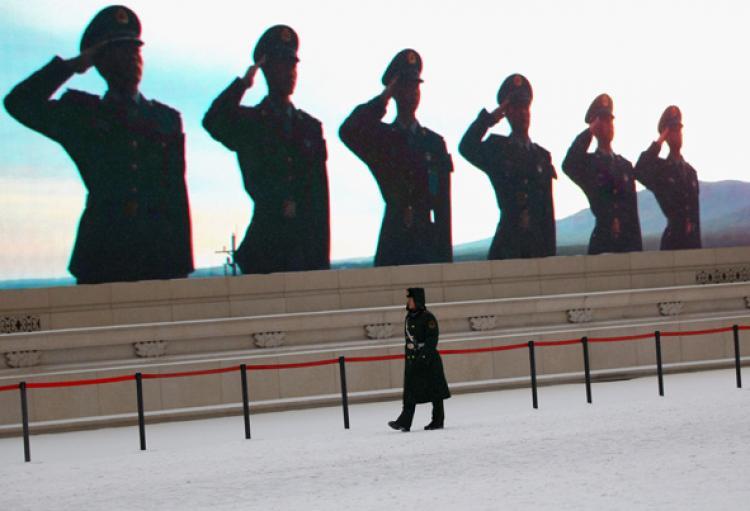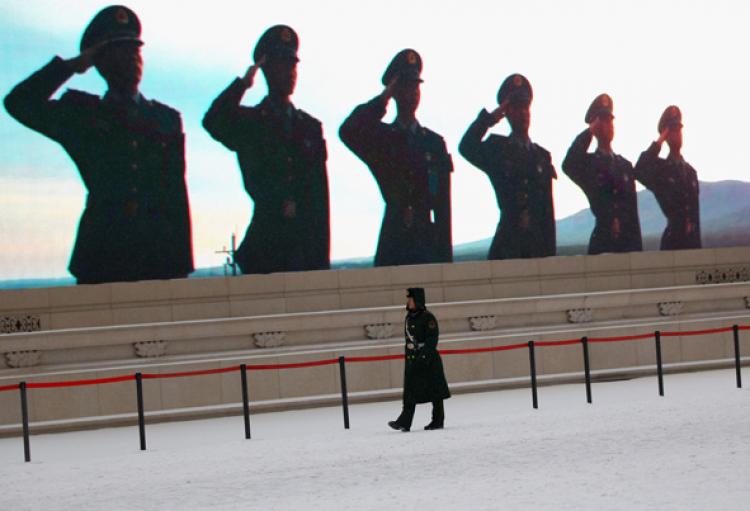While U.S. officials continue to attempt to conduct business with the Chinese regime, behind the scenes, the Chinese Communist Party (CCP) is building a military intended to defeat the United States.
“It is clear that we are dealing with a military that is focused and serious about finding ways in which to defeat us should a conflict occur,” states a testimony given to the U.S. China Economic and Security Review Commission, by Roger Cliff of the RAND Corporation, on Jan. 27.
“Although the ongoing conflicts in Southwest Asia will rightly remain the emphasis of U.S. military resources and planning for the time being, we also need to engage in an effort to acquire the capabilities to counter those that China is acquiring that are at least as focused and systematic as those which China is engaged in,” states Cliff.
The CCP military strategy is designed to defeat a military that is superior using “anti-access” strategies. It is developing ways to disable or destroy the elements that would give the United States an upper hand on the battlefield without having to engage them directly in combat.
Ambitions are very clear when it comes to the regime’s overall goals. One report, “Global geopolitical changes and China’s strategic choices” by Li Limin, describes China’s desire to disrupt relations between the United States and Japan, control Taiwan and the South China Sea, and keep its own military strength hidden.
“Li Limin believes that this strategy will become increasingly easy to implement in the coming years. Between 2026 and 2037, China will overtake the United States as the leading global economic power. It will then have a wider stage on which to demonstrate its capacity for strategic initiative, ‘letting its writ run without constraint,” wrote the European Council on Foreign Relations citing Limin’s report.
According to Cliff, “China’s military is modernizing rapidly, but still has a long way to go before it reaches the level of the U.S. military.”
He cites a 2006 Chinese defense white paper that outlines “the Chinese military’s goal is to have made ‘major progress’ in its modernization by 2020 and be capable of winning a high-technology conflict by the middle of the century.” The white paper is titled, “State Council of the People’s Republic of China, China’s National Defense in 2006.”
In order to meet its goal, the CCP is building its military according to the guidance of Chinese military publications that have identified several key areas of the U.S. military it would need to destroy in a conflict.
“These can be grouped into attacks on the bases and platforms from which adversary combat aircraft would operate; attacks on adversary systems and facilities used to transport, supply, and repair and maintain forces in the theater; and attacks on adversary systems used to collect, process, and disseminate information for forces in the theater,” Cliff states.
It also names ways of disabling U.S. systems to transfer data. The CCP would use a variety of methods including cyber-attacks and ways to disable satellites.
According to Cliff, the development of China’s military is closely aligned with defeating the United States. He states “These concepts are not just academic musings disconnected from actual planning and force development. ...
“Comparing the military capabilities China has acquired over the past decade or so with the force employment concepts found in Chinese writings and the locations of U.S. air and naval bases and operating areas in the western Pacific, one cannot but be impressed by the systematic and methodical way in which the PLA [People’s Liberation Army] has gone about acquiring the capabilities needed to successfully implement those concepts.”
Next: Emerging Threats
“It is clear that we are dealing with a military that is focused and serious about finding ways in which to defeat us should a conflict occur,” states a testimony given to the U.S. China Economic and Security Review Commission, by Roger Cliff of the RAND Corporation, on Jan. 27.
“Although the ongoing conflicts in Southwest Asia will rightly remain the emphasis of U.S. military resources and planning for the time being, we also need to engage in an effort to acquire the capabilities to counter those that China is acquiring that are at least as focused and systematic as those which China is engaged in,” states Cliff.
The CCP military strategy is designed to defeat a military that is superior using “anti-access” strategies. It is developing ways to disable or destroy the elements that would give the United States an upper hand on the battlefield without having to engage them directly in combat.
Ambitions are very clear when it comes to the regime’s overall goals. One report, “Global geopolitical changes and China’s strategic choices” by Li Limin, describes China’s desire to disrupt relations between the United States and Japan, control Taiwan and the South China Sea, and keep its own military strength hidden.
“Li Limin believes that this strategy will become increasingly easy to implement in the coming years. Between 2026 and 2037, China will overtake the United States as the leading global economic power. It will then have a wider stage on which to demonstrate its capacity for strategic initiative, ‘letting its writ run without constraint,” wrote the European Council on Foreign Relations citing Limin’s report.
An Overarching Strategy
According to Cliff, “China’s military is modernizing rapidly, but still has a long way to go before it reaches the level of the U.S. military.”
He cites a 2006 Chinese defense white paper that outlines “the Chinese military’s goal is to have made ‘major progress’ in its modernization by 2020 and be capable of winning a high-technology conflict by the middle of the century.” The white paper is titled, “State Council of the People’s Republic of China, China’s National Defense in 2006.”
In order to meet its goal, the CCP is building its military according to the guidance of Chinese military publications that have identified several key areas of the U.S. military it would need to destroy in a conflict.
“These can be grouped into attacks on the bases and platforms from which adversary combat aircraft would operate; attacks on adversary systems and facilities used to transport, supply, and repair and maintain forces in the theater; and attacks on adversary systems used to collect, process, and disseminate information for forces in the theater,” Cliff states.
It also names ways of disabling U.S. systems to transfer data. The CCP would use a variety of methods including cyber-attacks and ways to disable satellites.
According to Cliff, the development of China’s military is closely aligned with defeating the United States. He states “These concepts are not just academic musings disconnected from actual planning and force development. ...
“Comparing the military capabilities China has acquired over the past decade or so with the force employment concepts found in Chinese writings and the locations of U.S. air and naval bases and operating areas in the western Pacific, one cannot but be impressed by the systematic and methodical way in which the PLA [People’s Liberation Army] has gone about acquiring the capabilities needed to successfully implement those concepts.”
Next: Emerging Threats







